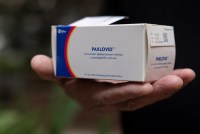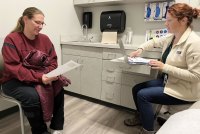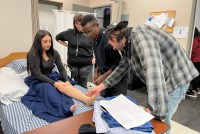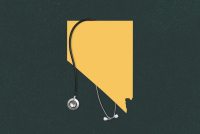Latest KFF Health News Stories
Paxlovid Has Been Free So Far. Next Year, Sticker Shock Awaits.
The government soon will stop paying for the covid drug that has proved to be the most effective at keeping patients alive and out of the hospital.
Employers Use Patient Assistance Programs to Offset Their Own Costs
Some insurers and employers are tapping into assistance programs meant for individual patients. The concern: Some costly drugs could be harder for patients to access.
Florida Leaders Misrepresented Research Before Ban on Gender-Affirming Care
The Florida policy backed by Gov. Ron DeSantis relies on one key statistic that many experts question.
Assisted Living Facilities Pressed to Address Growing Needs of Older, Sicker Residents
Assisted living was meant to be a home-like setting where older adults could interact with other residents while receiving help with daily tasks such as bathing and dressing. But as the concept has become more popular, residents are now older and sicker than in the past, and a panel of experts is calling for more focus on their medical and mental health needs.
Much of the CDC Is Working Remotely. That Could Make Changing the Agency Difficult.
Like many U.S. workplaces, the Centers for Disease Control and Prevention went remote during the pandemic. Most of the agency’s staff members haven’t returned to the office full time, raising concerns about the CDC’s ability to reform itself after recent stumbles.
Para lanzar un nuevo fármaco al mercado, la Administración de Alimentos y Medicamentos (FDA) exige a las farmacéuticas estudios exhaustivos para demostrar su seguridad y eficacia. Conseguir que un medicamento salga al mercado unos meses antes, y con menos gastos de lo habitual, puede traducirse en beneficios millonarios para el fabricante.
The Business of Clinical Trials Is Booming. Private Equity Has Taken Notice.
Private equity-backed Headlands Research heralded its covid-19 vaccine trials as a chance to boost participation among diverse populations, then it shuttered multiple sites that conducted them.
Addiction Treatment Proponents Urge Rural Clinicians to Pitch In by Prescribing Medication
The number of U.S. health care providers certified to prescribe buprenorphine more than doubled in the past four years, and treatment advocates hope to see that trend continue.
Rural Colorado Tries to Fill Health Worker Gaps With Apprenticeships
A Grand Junction program is training and retaining nurse and personal care aides in areas where the aging population is creating a need for them. But challenges remain for these workers.
Trickle of Covid Relief Funds Helps Fill Gaps in Rural Kids’ Mental Health Services
Only a sliver of the funding given to state, local, and tribal governments through the American Rescue Plan Act has been steered to mental health nationwide, but mental health advocates and clinicians hope the money it provides will help address gaps in care for children. In Appalachian Ohio, the funding is helping expand services.
California Aims to Maximize Health Insurance Subsidies for Workers During Labor Disputes
Workers who lose employer-based health coverage during a strike or lockout will have access to a full-subsidy plan through Covered California.
Patient Mistrust and Poor Access Hamper Federal Efforts to Overhaul Family Planning
For decades, many women of color, particularly those with low incomes, had little control over their family planning care. Now, a White House effort aims to give patients more choices as abortion care evaporates, but patients remain wary of providers.
Audits — Hidden Until Now — Reveal Millions in Medicare Advantage Overcharges
Taxpayers had to foot the bills for care that should have cost far less, according to records released after KHN filed a lawsuit under the Freedom of Information Act. The government may seek to recover up to $650 million as a result.
Hay más infecciones sexuales y empresas producen más tests caseros… ¿son confiables?
Datos preliminares para 2021 mostraron cerca de 2.5 millones de casos reportados de clamidia, gonorrea y sífilis en el país, según los Centros para el Control y Prevención de Enfermedades.
Mistrust and Polarization Steer Rural Governments to Reject Federal Public Health Funding
As the covid-19 pandemic grinds on, Elko County, Nevada, still lacks a public health department. Yet its elected leaders rejected federal funds that could have helped it create one. Decisions like the one in Elko, and ones made by officials with other state and local governments, leave health experts concerned about whether the country’s public health infrastructure will be prepared to handle future health challenges.
As STDs Proliferate, Companies Rush to Market At-Home Test Kits. But Are They Reliable?
The popularity of at-home covid tests has amplified calls from public health researchers and diagnostic companies to make home testing similarly routine for sexually transmitted diseases. But FDA guidelines are lagging.
Fight Over Health Care Minimum Wage Yields a Split Decision in Southern California
Voters in Inglewood were poised to approve a union-backed $25 minimum wage for workers at private hospitals and facilities, while Duarte voters rejected it.
How Banks and Private Equity Cash In When Patients Can’t Pay Their Medical Bills
Hospitals strike deals with financing companies, generating profits for lenders, and more debt for patients.
Los mentores trabajan, sin límites, en la recuperación de adicciones
Los especialistas en apoyo a pares están ellos mismos en recuperación y se los contrata para ayudar a otros. Pueden vincularse con los pacientes de una manera distinta que los profesionales de salud.
The Player-Coaches of Addiction Recovery Work Without Boundaries
States, tribes, and local governments are figuring out how best to spend billions of dollars from an opioid lawsuit settlement. One option they’re considering is funding peer support specialists, who guide people recovering from addiction as they do it themselves.























